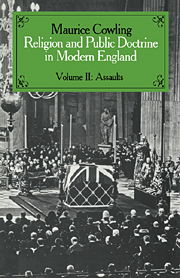Book contents
- Frontmatter
- Foreword
- Contents
- Projected contents of Volume III (for publication c. 1988–90)
- INTRODUCTION
- I THE ASSAULT ON THE EIGHTEENTH CENTURY
- 1 Tractarianism as Assault
- 2 Ruskin and Protestantism
- 3 Gladstone, Oxford and Christianity
- 4 Tractarianism as Constructive Assault
- II THE ASSAULT ON CHRISTIANITY
- III THE ASSAULT ON CHRISTIANITY IN THE TWENTIETH CENTURY
- IV ASSAULTS ON THE ASSAILANTS
- CONCLUSION: ASSAULTS AND ACCOMMODATIONS
- Notes
- Index of main names
3 - Gladstone, Oxford and Christianity
Published online by Cambridge University Press: 23 December 2009
- Frontmatter
- Foreword
- Contents
- Projected contents of Volume III (for publication c. 1988–90)
- INTRODUCTION
- I THE ASSAULT ON THE EIGHTEENTH CENTURY
- 1 Tractarianism as Assault
- 2 Ruskin and Protestantism
- 3 Gladstone, Oxford and Christianity
- 4 Tractarianism as Constructive Assault
- II THE ASSAULT ON CHRISTIANITY
- III THE ASSAULT ON CHRISTIANITY IN THE TWENTIETH CENTURY
- IV ASSAULTS ON THE ASSAILANTS
- CONCLUSION: ASSAULTS AND ACCOMMODATIONS
- Notes
- Index of main names
Summary
‘As, therefore, it is rationalistic to say, Christian doctrine must be true or false, according as it is agreeable or repugnant to our natural perceptions, so also is it rationalistic to … maintain that intellectual apprehension is a necessary or invariable precondition of spiritual agency upon the soul. As the need and the applicability of Divine influences are so large in extent and embrace so many more persons than possess an active understanding, the rationalism which makes these influences dependent on doctrine only as the medium of their conveyance to men, is exceedingly dangerous to Christianity. By all these considerations we are prepared to anticipate, in a religion having the wide scope of the Gospel, some distinct provision for the conveyance of grace otherwise than through the understanding or in connexion with its agency; and some rites or institutions which should both convey grace in this separate and transcendent manner, and likewise mark, to the view of men, in the most forcible manner, the distinctness of these channels; and the complex and mystical constitution of all religious ordinances whatever, as consisting of an outward representation or instrumentality, and an inward living power.’
W. E. Gladstone Church Principles 1840 p. 84.‘It has indeed been said that the old phrase of “saving one's soul” has ceased to have much meaning for the religion of educated people in the present day. If this be indeed true, we can only rejoin in all truth and sorrow, so much the worse for the “educated people”. […]
- Type
- Chapter
- Information
- Religion and Public Doctrine in Modern England , pp. 52 - 85Publisher: Cambridge University PressPrint publication year: 1985



